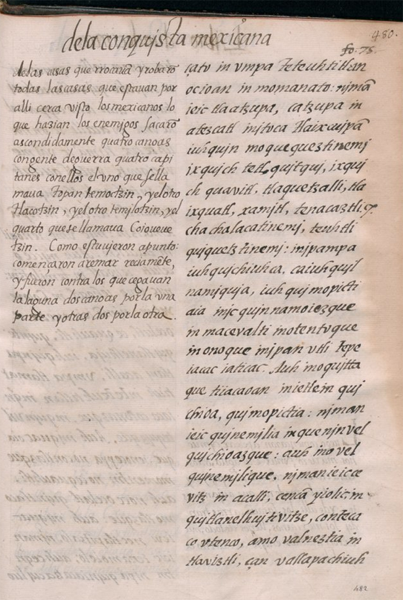Folio 75 recto
Translations and Transcriptions
Spanish Translation
[Translation of the Nahuatl into Spanish by Fr. Bernardino de Sahagún; transcription of the Spanish (left-hand column) by James Lockhart:] [f. 75r.] de las casas que rrocauā* y robarō todas las casas que estauan por alli cerca visto los mexicanos lo que hazia los enemigos sacarō ascondidamente quatro canoas con gente de guerra quatro capitanes con ellos el vno que se llamaua Topantemoctzin, y el otro Tlacotzin, y el otro temilotzin, y el quarto que se llamaua Coioueuetzin. Como estuuieron a punto: començaron a remar reciamēte, y fueron contra los que cegauan la laguna dos canoas por la vna parte y otras dos por la otra. ---------- *RROCAUĀ. For "derrocauā."
English Translation
[Translation of the Nahuatl (right-hand column) by James Lockhart:] at Teteuhtitlan; it was still dark when they took position. Then they began filling in the waters, filling in a small lake called Tlaixcuipan. They seemed to go jostling each other, some carrying stone, some wood, pillars, door lintels, adobes, corner stones, etc. They went about chattering, raising the dust. The reason they did it was that it occurred to them and they imagined that they would plunder the common people who lived beside the road going to Tepeyacac. And when the [Mexica] warriors saw what they were doing and what their intention was, they considered what they could do. And when they considered well, a boat was brought; they came poling it very slowly, stationing it at the side of the road. No warrior’s device could be seen; everything was just covered over. [Translation of the Spanish (left-hand column) by James Lockhart:] from the houses they had demolished, and they robbed all the houses that were in that vicinity. When the Mexica saw what the enemy was doing, they secredy got out four canoes full of warriors under four captains, one of whom was called Topantemoctzin, another Tlacotzin, another Temilotzin, and the fourth Coyohuehuetzin. When they were ready, they began to paddle [pole] with vigor, and with two canoes on one side, and the other two on the other, they went against, those who were filling in the lake.
Analytic Transcription
[Transcription of the Nahuatl (right-hand column) by James Lockhart:] [f. 75r.] çato in vmpa Teteuhtitlan oc ioan in momanato: nimā ie ic tlaatzupa, catzupa in atezcatl in itoca Tlaixcuipā iuhquin moquequeztinemi ixquich tetl quitqui, ixquich quavitl, tlaquetzalli, tlaixquatl, xamitl, tenacaztli .&. chachalacatinemi, teuhtli quiquetztinemi: in ipampa iuh quichiuhca, ca iuh quilnamiquia, iuh quimopictiaia, inic quinnamoiezque in macevalti in otentoque in onoque in ipan vtli tepeiacac iaticac. Auh in oquittaque tiiacaoan in ie tlein quichioa, quimopictia: niman ie ic quinemilia in quenin vel quichioazque: auh in o vel quinemilique, niman ie ic ce vitz in acalli, cencā yiolic, in quitlanelhuitivitze, contecaco vtenco, amo valneztia in tlaviztli, çan vallapachiuh
Image

Spanish Translation
[Translation of the Nahuatl into Spanish by Fr. Bernardino de Sahagún; transcription of the Spanish (left-hand column) by James Lockhart:] [f. 75r.] de las casas que rrocauā* y robarō todas las casas que estauan por alli cerca visto los mexicanos lo que hazia los enemigos sacarō ascondidamente quatro canoas con gente de guerra quatro capitanes con ellos el vno que se llamaua Topantemoctzin, y el otro Tlacotzin, y el otro temilotzin, y el quarto que se llamaua Coioueuetzin. Como estuuieron a punto: començaron a remar reciamēte, y fueron contra los que cegauan la laguna dos canoas por la vna parte y otras dos por la otra. ---------- *RROCAUĀ. For "derrocauā."
English Translation
[Translation of the Nahuatl (right-hand column) by James Lockhart:] at Teteuhtitlan; it was still dark when they took position. Then they began filling in the waters, filling in a small lake called Tlaixcuipan. They seemed to go jostling each other, some carrying stone, some wood, pillars, door lintels, adobes, corner stones, etc. They went about chattering, raising the dust. The reason they did it was that it occurred to them and they imagined that they would plunder the common people who lived beside the road going to Tepeyacac. And when the [Mexica] warriors saw what they were doing and what their intention was, they considered what they could do. And when they considered well, a boat was brought; they came poling it very slowly, stationing it at the side of the road. No warrior’s device could be seen; everything was just covered over. [Translation of the Spanish (left-hand column) by James Lockhart:] from the houses they had demolished, and they robbed all the houses that were in that vicinity. When the Mexica saw what the enemy was doing, they secredy got out four canoes full of warriors under four captains, one of whom was called Topantemoctzin, another Tlacotzin, another Temilotzin, and the fourth Coyohuehuetzin. When they were ready, they began to paddle [pole] with vigor, and with two canoes on one side, and the other two on the other, they went against, those who were filling in the lake.
Analytic Transcription
[Transcription of the Nahuatl (right-hand column) by James Lockhart:] [f. 75r.] çato in vmpa Teteuhtitlan oc ioan in momanato: nimā ie ic tlaatzupa, catzupa in atezcatl in itoca Tlaixcuipā iuhquin moquequeztinemi ixquich tetl quitqui, ixquich quavitl, tlaquetzalli, tlaixquatl, xamitl, tenacaztli .&. chachalacatinemi, teuhtli quiquetztinemi: in ipampa iuh quichiuhca, ca iuh quilnamiquia, iuh quimopictiaia, inic quinnamoiezque in macevalti in otentoque in onoque in ipan vtli tepeiacac iaticac. Auh in oquittaque tiiacaoan in ie tlein quichioa, quimopictia: niman ie ic quinemilia in quenin vel quichioazque: auh in o vel quinemilique, niman ie ic ce vitz in acalli, cencā yiolic, in quitlanelhuitivitze, contecaco vtenco, amo valneztia in tlaviztli, çan vallapachiuh
Image
